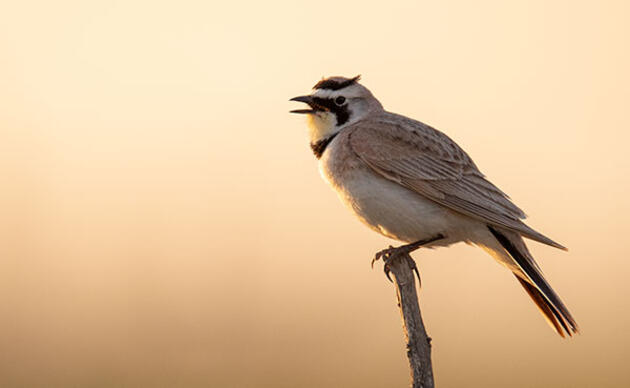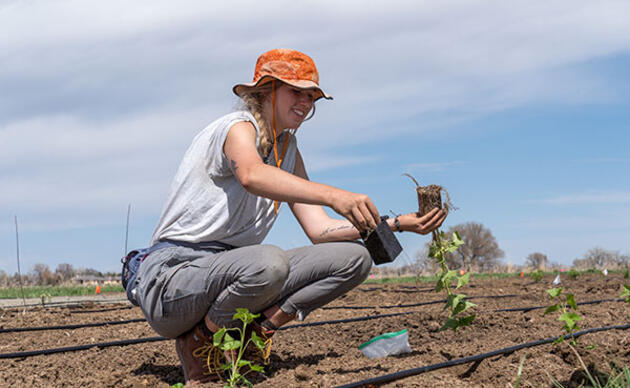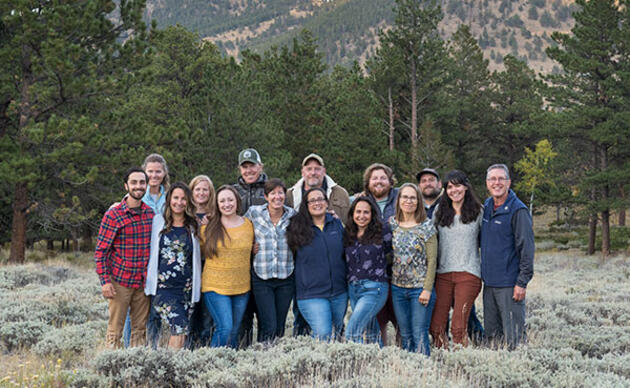The answer to both questions is generally yes, but it's complicated.
What Does "Buy Local" Mean For Gardeners?
Buying local means searching out nurseries that sell locally grown plants, using local landscaping materials (especially soil and mulch), and buying seeds grown and harvested locally wherever possible.
It’s not easy. And the definition of local needs to be somewhat elastic, because not everyone can buy everything in their town or watershed or however you want to define "local." The buy local idea makes sense for a lot of reasons, including:
Better-adapted Plants and Seeds: Plants grown locally are often already attuned to the local climate and soils, and thus have a better chance of thriving. Same for seeds—their genes “know” the local conditions.
How do you know what's "local"? One way is to look for the Plant Select® label, identifying plants developed specifically for our region. Another is to ask the nursery where their plants are grown.
"Local" applies even more strongly to native plants. Plants may be labeled "native" if they grow anywhere on the North American continent. That's fine, but imagine trying to grow a native Florida saw palmetto in a Colorado or Wyoming garden--bad idea! So look for what region a native plant comes from.
Recognize too, that even within regions, growing conditions vary widely, as say, the difference between an alpine penstemon and a penstemon native to the plains. Which one is more likely to grow well in your garden? That depends on where your garden is, including elevation, exposure and soil. Knowing your conditions helps you define "local" for your own site.
Fewer Hitchhikers: Plants, seeds and landscape materials imported from elsewhere—especially distant regions or other continents—often come with unwanted and destructive hitchhikers.
Tumbleweed (AKA Russian Thistle) and cheatgrass, for instance, hitched to this continent from Central Asia in agricultural seed. The devastating emerald ash borer, recently found in Colorado, most likely traveled to North America in the wood of shipping pallets. Dutch Elm Disease, a fungus, came to this continent in diseased logs from Europe in the 1930s, but it probably originated in Asia.
Bark mulch is another great example of the importance of buying local: Bark is home dozens or hundreds of kinds of critters, from microscopic bacteria and fungi to visible insects. These organisms can hitch rides as eggs, spores, larvae or adults. Importing bark mulch from another region may bring that region's bark-dwellers, not all of which may be "friendly" to your garden. (Imagine finding a live bark scorpion in your bag of mulch.)
Avoiding Pesticides: Buying local means knowing the source for your plants and seeds, and being able to choose those not grown with persistent noxious chemicals. While your local plant-supplier may not grow all of their plants, they know who does and can ask about their growing practices.
This is especially important with the widespread use of neonicotinoid pesticides, which are taken up by the plant and integrated in its tissues, and thus can poison pollinators who visit the flowers. (Neonicotinoids are also used on seeds, with the same persistent deadly effects. Ask seed-suppliers how their seeds are treated.)
Define "Local" Flexibly
What if you don't have a local nursery or other plant-supplier, or if your best source for native or regionally adapted plants is a nursery not in your area? Local can refer more to the plants' adaptability to your conditions than to where it was grown.
Our Communications Director was thrilled when High Country Gardens released ‘Poncha Pass Red’ Sulphur-Flowered Buckwheat as one of its 2014 Plants of the Year. (Native buckwheats are prime bee- and butterfly-flowers, but hard to find in the nursery trade.) Not only is ‘Poncha Pass Red’ native to Tweit's region, it’s truly local. HCG founder and Chief Horticulturist David Salman collected the buckwheat in Tweit's own valley, on Poncha Pass, about 20 miles from her house.
Those 'Poncha Pass Red' sulphur-flowered buckwheat were the first wildflowers to bloom in Tweit's garden this spring. No sooner had their tiny chrome yellow flowers opened then a small and speedy native bee declared them its territory, zipping around the plants as if protecting an invisible perimeter.
So yes, "buy local" does matter for habitat gardening and wildscaping!
Join Audubon Rockies, Plant Select® and High Country Gardens in promoting wildscaping. Be a Habitat Hero!
By Habitat Hero
Stay in the Know
Sign up for emails to stay up to date on how you can help and enjoy birds in Colorado, Wyoming, and Utah.




